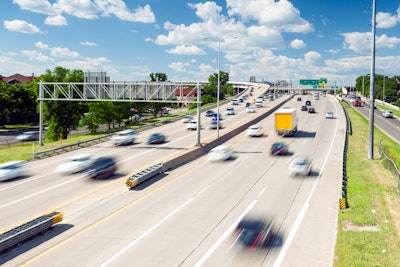
President Joe Biden is calling on Congress to suspend the federal gas tax for three months, through September. He is also asking states to take similar action to provide some direct relief, whether suspending their own gas taxes or helping consumers in other ways.
According to the American Road & Transportation Builders Association (ARTBA) lawmakers in New York, Florida, Connecticut, Maryland and Georgia have suspended their state gas tax collections this year as pump prices soar to over $5 per gallon. So far this year, ARTBA’s Transportation Investment Advocacy Center (TIAC) has tracked 72 bills in 26 states that suspend or repeal transportation funding revenue sources.
The current federal gas tax is about 18.4 cents, according to the U.S. Energy Information Administration, while the federal tax on diesel stands at 24 cents per gallon. New research has shown that gas tax holidays do not automatically result in significantly lower prices and big savings for motorists at the pump, and even if savings from lifting those taxes were passed directly to consumers – which isn’t guaranteed – the savings for one fill-up could only be a few dollars.
For example, a person who drives 12,000 miles a year in a car that averages 25 miles per gallon would only save about $55 if the federal gas tax was suspended for the rest of 2022.
However, the Federal gas tax suspension could be detrimental to the long term health of our infrastructure. The gas tax provides an important source of funding for road construction and the overall loss of tax revenue is estimated to be close to $15 billion. That's money that won't be available for road repairs and other needed infrastructure projects.
Biden's announcement said he will call for using other revenue sources to make up for the shortfall however, and said he does not want to take money away from the Highway Trust Fund.
"The President is also calling on Congress to make sure that a gas tax holiday has no negative effect on the Highway Trust Fund," the fact sheet said. "With our deficit already down by a historic $1.6 trillion this year, the President believes that we can afford to suspend the gas tax to help consumers while using other revenues to make the Highway Trust Fund whole for the roughly $10 billion cost. This is consistent with legislation proposed in the Senate and the House to advance a responsible gas tax holiday."
Temporarily suspending the gas tax is one of the few tools the federal government has to cut gas prices however, Kiplinger explains. Other options include tapping the Strategic Petroleum Reserve, encouraging oil production, and allowing more ethanol in gasoline.
Here's a round up of where state gas tax suspensions stand:
- This week Kentucky Gov. Andy Beshear (D) suspended a 2-cents-per-gallon increase in the state gas tax scheduled for July 1.
- Illinois earlier suspended a similar scheduled increase.
- New York suspended its 16 cents-per-gallon state gas tax for the rest of the year, joining Florida, Connecticut, Maryland and Georgia, which earlier enacted temporary state gas tax suspensions.
- Colorado lawmakers passed a bill delaying its road usage charge.
- Tennessee has suspended its vehicle registration fee.
Maryland, one of the first states to enact a gas tax freeze in March, let its suspension expire after 30 days. Lawmakers there also declined to prevent a gas tax increase from taking effect July 1, saying that the state cannot afford to lose the $200 million in annual funding the tax increase would generate for roads, bridges and transit projects.
The Future of Infrastructure Funding
It's understandable that Americans want to find pricing relief anywhere they can. Inflation is estimated to cost American families approximately $5,200 more this year alone. States who have raised their gas taxes have done so in an effort in increase money for their aging infrastructure and suspending the gas tax longterm could have detrimental impacts on our infrastructure.
The industry knows the gas tax is not a longterm solution with increasing fuel efficiency and the rise of electric vehicles, but we also live in a today-world where we need to find solutions now while we also future-proof funding for our infrastructure.
Right now, the Highway Trust Fund (HTF) is funded by federal fuel excise taxes and other fees and is the primary funding source of transportation infrastructure projects. As EV use grows and we change our infrastructure to accomodate them, we also need to change our laws and unfortunately, the infrastructure bill passed last year ignored the HTF insolvency.
Under current legislation, EV owners aren’t contributing to the HTF which continues to receive transfers from the general fund to keep it solvent. The Committee for a Responsible Federal Budget, a nonprofit and nonpartisan organization, projects that the HTF will experience a $215 billion shortfall through 2031 under current law.
As EVs will make up a greater share of the cars on the roads as we move into the future, the HTF shortfall will similarly grow unless we change our laws. Congress can address the long-term solvency issues of the HTF by ensuring all drivers pay their fair share by changing the federal gas tax model to a user-fee model.
Funding for infrastructure projects, particularly highways and roads, have been user-fee paid for years with the gas tax. By changing that model to usage charge, one that charges motorists based on miles driven, not on the number of gallons paid for at the pump, every vehicle will in turn pay their fair share to use our roadways.
As Michigan lawmakers consider suspending the excise and sales taxes on gasoline, to save Michigan drivers 51 cents per gallon at the pump, the Mackinac Center for Public Policy recently unveiled research that indicated the state’s funding system could be enhanced if lawmakers adopt such a user fee system. The nonprofit says residents would be billed on mileage similarly to how they would be billed for utility payments.
They study also shows tax revenues decrease with time despite increases in gas taxes and the research institute goes on to say that increased fuel efficiency would bring a deficit in gas tax revenue of $1 billion per year by 2050.
“It’s important to ‘future-proof’ Michigan’s highway revenue, making it independent of vehicle propulsion sources,” says Reason Foundation Director of Transportation Policy Robert Poole, who co-authored the study. “About a dozen other states have carried out pilot projects to test per-mile charges, and they have learned a lot about what works and what doesn’t work. Michigan can benefit from their experience by implementing a pilot project on per-mile charges in the near future."
User-based fees have been implemented in several states, but take time to implement - time our continually crumbling infrastructure does not have.
Recently, Rep. Lloyd Smucker (R-PA) introduced the USER FEE Act (Using Sustainable Energy Resources to Fund Equitable e-Transportation Act) which would establish a user fee of two cents per mile traveled for EVs and one cent per mile traveled for plug-in hybrid vehicles. Under the legislation, the Department of the Treasury is directed to work with states, which oversee and regulate vehicle registration, to coordinate this program.
"In order to get the trust fund’s long-term financials on firmer footing, it is critical that Congress pass the USER FEE Act," Smucker says. "This bill will ensure that electric vehicles are paying for the roads they drive on."




















